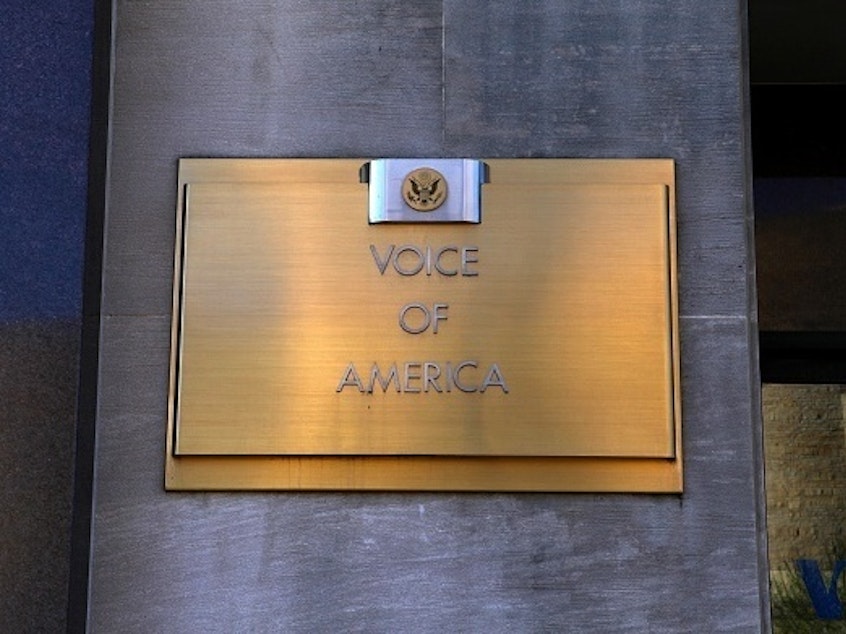White House Attacks Voice Of America Over China Coronavirus Coverage

The Voice of America defended itself Friday against accusations by the Trump White House that the news service is uncritically relaying Chinese propaganda about that country's effort to contain the COVID-19 pandemic.
"VOA too often speaks for America's adversaries—not its citizens," The White House charged in an official statement released Thursday. "Journalists should report the facts, but VOA has instead amplified Beijing's propaganda." (Boldface reflects the original statement.)
The remark was notable even from an administration that misses few opportunities to attack news organizations for reporting that reflects poorly upon the president.
The statement was released under the headline, "Voice of America spends your money to speak for authoritarian regimes." It attacked VOA for, among other things, a tweet showing a video of a light show against the Wuhan skyline. The show celebrated the end of the lockdown in that city, where the coronavirus first truly took flight.
The White House statement also took issue with the news agency calling the Chinese efforts in Wuhan to contain the virus a "model" for other nations. It said VOA relied on unverifiable Chinese government statistics in some reporting. Those numbers have come under severe critical assessments from other countries' officials - and from the press, including journalists at Voice of America.
Sponsored
In a strongly worded response, Voice of America Director Amanda Bennett never mentioned the Trump administration. Instead, Bennett - a former top editor at the Wall Street Journal, The Philadelphia Inquirer, and Bloomberg News, among other well-regarded outlets - noted that the Voice of America's freedom to report all sides of an issue is enshrined in a 1976 federal statute signed by President Gerald R. Ford, who, like Trump, was a Republican.
"Unlike China, VOA has stuck to verifiable facts, including publishing numerous articles in Mandarin, English and other languages that outed China's initial secrecy keeping information of the initial outbreak from the world," Bennett said. "VOA has thoroughly debunked much of the information coming from the Chinese government and government-controlled media."
She offered a long list of stories that looked critically at the Chinese response to the virus and the statistics it offered publicly.
"It is outrageous that the White House is attacking Voice of America, which has a tradition of reporting stories that challenge the narratives of authoritarian regimes around the world," said Joel Simon, executive director of the Committee to Protect Journalists. "At this moment, citizens in some highly censored countries are depending for their health and safety on VOA news of the coronavirus, and President Trump should absolutely not undermine the news outlet's efforts to do its job."
Dan Scavino, an adviser to the president who handles his social media strategy, called the Voice of America a "disgrace" in one of several tweets on the topic.
Sponsored
Ted Lipien, a former acting associate director of the VOA, wrote on Facebook that the China video was the latest in a string of instances when the VOA posted raw video of what were, effectively, propaganda events without appropriate balance. He cited videos from Russia, China and Iran.
Wrote Bennett, "Our coverage includes this week's fact-check of the Chinese government's false timeline of its COVID-19 response, its misleading count that excluded asymptomatic cases, China's underestimate of the number of deaths in Wuhan and its use of Twitter to further its narrative internationally — a platform the Chinese government has banned domestically. VOA has literally carried hundreds of stories on China's response and narrative."
And she noted that most of VOA's journalists, like those of the New York Times and other news outlets, had been "effectively barred" from reporting inside China on the crisis.
The Voice of America is overseen by the CEO of the U.S. Agency for Global Media. The agency's governing board is appointed by the president with the consent of the U.S. Senate. A seat is permanently reserved for the sitting U.S. Secretary of State. Trump's top diplomat, Secretary Mike Pompeo, has been notably quiet on the controversy.
DISCLOSURE: NPR CEO John Lansing is the former CEO of the U.S. Agency for Global Media. No NPR executive had prior knowledge of this story or reviewed it before it was publicly posted. It was reported by NPR media correspondent David Folkenflik and edited by NPR technology and media editor Emily Kopp. [Copyright 2020 NPR]



